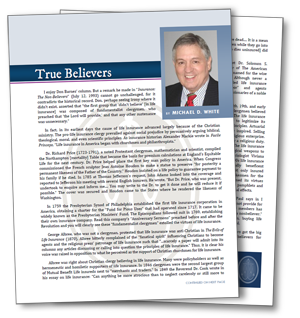 I enjoy Don Barnes’ column. But a remark he made in "Insurance: The Non-Believers” (July 12, 1993) cannot go unchallenged, for it contradicts the historical record. Don, perhaps seeing irony where it didn’t exist, asserted that "the first group that ‘didn’t believe’ [in life insurance] was composed of fundamentalist clergymen, who preached that ‘the Lord will provide,’ and that any other sustenance was unnecessary.”
I enjoy Don Barnes’ column. But a remark he made in "Insurance: The Non-Believers” (July 12, 1993) cannot go unchallenged, for it contradicts the historical record. Don, perhaps seeing irony where it didn’t exist, asserted that "the first group that ‘didn’t believe’ [in life insurance] was composed of fundamentalist clergymen, who preached that ‘the Lord will provide,’ and that any other sustenance was unnecessary.”
In fact, in its earliest days the cause of life insurance advanced largely because of the Christian ministry. The pro-life insurance clergy prevailed against social prejudice by persuasively arguing biblical, theological, moral, and even scientific principles. As insurance historian Alexander Mackie wrote in Facile Princeps,
"Life insurance in America began with churchmen and philanthropists."
Dr. Richard Price (1723-1791), a noted Protestant clergyman, mathematician and scientist, compiled the Northampton [mortality] Table that became the basis for premium calculations at England’s Equitable Life for the next century. Dr. Price helped place the first key man policy in America. When Congress commissioned the French sculptor Jean Antoine Houdon to make a statue to preserve "for posterity a permanent likeness of the Father of the Country,” Houdon insisted on a life policy to guarantee payment to his family if he died. In 1785 at Thomas Jefferson’s request, John Adams looked into the coverage and reported to Jefferson his meeting with several English insurers. He wrote, "But Dr. Price, who was present, undertook to enquire and inform me.... You may write to the Dr. to get it done and he will reduce it if possible.” The cover was secured and Houdon came to the States where he rendered the likeness of Washington.
In 1759 the Presbyterian Synod of Philadelphia established the first life insurance corporation in America, obtaining a charter for the "Fund for Pious Uses” that had operated since 1717. It came to be widely known as the Presbyterian Ministers’ Fund. The Episcopalians followed suit in 1769, establishing their own insurance company. Read this company’s "Anniversary Sermons” preached before and after the Revolution and you will clearly see these "fundamentalist clergymen” extolled the virtues of life insurance.
George Albree, who was not a clergyman, protested that life insurance was anti-Christian in The Evils of Life Insurance (1870). Albree bitterly complained of the "fanatical spirit” influencing Christians to become agents and the religious press’ patronage of life insurance such that "...scarcely a paper will admit into its columns any articles discussing or calling into question the principles of life insurance.” Thus, it is clear his voice was raised in opposition to what he perceived as the support of Christian churchmen for life insurance.
Albree was right about Christian clergy believing in life insurance. Many were policyholders as well as hermeneutic and homiletic supporters of life insurance. In 1846 clergymen were the second largest group of Mutual Benefit Life insureds next to "merchants and traders.” In 1849 the Reverend Dr. Cook wrote in his essay on life insurance: "Can anything be more atrocious than to neglect carelessly or still more to neglect selfishly, the means in [a man’s] power of rescuing [his family]? I look to the moral danger and degradation...when I say it is the lesson of natural affection, of moral principle and of religious duty, to take every competent means to prevent such a consummation.”
In his Lectures on the Science of Life Insurance (1851), Moses Knapp proclaimed that "Many of the clergy in the United States have manifested deep and abiding interest in the progress of Life Insurance.... [T]he clergy of all denominations warmly espouse...life insurance, some even taking it upon them to act as local agents for companies...and urge the practice upon their flocks.”
In 1856 Reverend C. H. Spurgeon announced from his pulpit that he had insured his life for $5,000
and thus carried out the injunction of Jesus in Matthew 6:34 to "not be anxious about tomorrow."
Shortly thereafter in 1859, the Fifth Avenue Presbyterian Church became a key source of stockholders for Henry Hyde when he founded the Equitable.
In his 1861 Address to Christian Pastors and Churches on Life Insurance, Rev. D. D. Lore admonished: "Let him not have the folly or the hypocrisy to say, as is sometimes said by those who neglect this precaution, that they trust to Providence. What right has any man to trust Providence to do for him, directly or through the mediation of others what it has enabled him to do for himself?.... The wisdom and goodness of Providence appear in giving him this power and placing him in circumstances in which he can exercise it.”
The famous Reverend Henry Ward Beecher put Truth in a Nutshell (1869) when he said: "Once the question was: can a Christian man rightfully seek Life Assurance? That day is passed. Now the question is: can a Christian man justify himself in neglecting such a duty?... We have no right to trust God for anything which he has enabled us to obtain by our own skill and industry.”
Reverend T. DeWitt Talmage, editor of the Christian Herald and Signs of Our Times, preached: "It is meanly selfish for you to be so absorbed in heaven...that you forget what is to become of your wife and children after you are dead.... It is a mean thing for you to go up to Heaven while they go into the poorhouse. [The man who dies uninsured] did not die, he absconded.”
And we must not forget Dr. Solomon S. Huebner, the founding father of The American College and a devout believer named for the wise king of the Old Testament. Although never a clergyman, Dr. Huebner called life insurance selling a "missionary labor” and agents "persuaders of men and the missionaries of a noble propaganda.”
The reality is that in the 18th, 19th, and early 20th centuries most Christian clergymen believed in the value of life insurance. The life insurance industry relied on Christianity to legitimize its form, purpose, and technical principles. Actuarial laws were regarded as divinely inspired. Selling life insurance was seen as a religious enterprise. Many viewed purchasing a policy a religious duty, and failure to purchase it a sin. The life insurance industry used moral and theological weapons to battle ideological resistance. Sociologist Viviana Zelizer noted that by the mid-1800s life insurance was "established as a morally beneficent institution.... Many clergymen not only insured their own lives but became spokesmen for the growing industry.” They proclaimed its virtues from their pulpits and even wrote pamphlets and journal articles favoring its beneficial effects.
This is not surprising since Paul says in I Timothy 5:8,
"And whosoever does not provide for relatives and especially for family members
has denied the faith and is worse than a nonbeliever." I Timothy 5:8
It is evident that, for a Christian, buying life insurance can be seen as fundamental.
Just wanted to make sure readers got the big picture. Christians aren’t called believers for nothing. Pax vobiscum.


